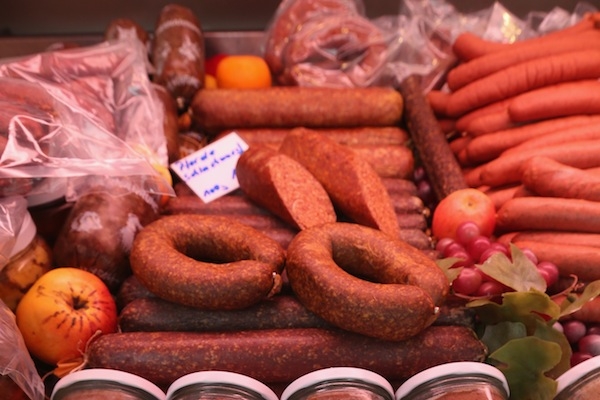At a club table, a group of us were discussing horse–eating, marvelling at the confusion and sentimentality of our fellow countrymen while telling hippophagic anecdotes. I mentioned a typically Provençal street market in Apt. There had been a group of horses. They were not looking happy. More intelligent than Boxer on his way to the knacker’s, they clearly sensed that the good days were over and were summoning reserves of stoicism to help them through the (brief) final phase. ‘What’s going to happen to those horses?’ inquired an English female member of the party. ‘Well, er, it is either the Sunday Joint Derby or the Hamburger Cup.’ ‘Oh no, I can’t bear it.’ I tried to console her by pointing out that in France, clapped-out old nags at least had the privilege of joining the human food chain. In the UK, it would have been the dog-food stakes (or so one then thought).
Strangely enough, she was not comforted. Half the girls spent half the night working out ways to bring those horses back to an honoured asylum in England; thus did Cordelia plan Lear’s final retirement. It did not help matters when someone revealed that I had bought both saucisson d’âne and saucisson de cheval from a stall, although I expressed doubts about the âne. ‘Every Provençal market overflows with the stuff,’ I said, ‘but you never see any donkeys in the fields.’ ‘That’s because they’ve all been eaten by heartless monsters like you,’ came the quick and obvious rejoinder. ‘Even so, there ought to be paddocks full of young Eeyores braying, regardless of their doom: scoffing grass and, one hopes, the odd apple to fatten -themselves up for next year’s saucisson harvest.’
The argument grew in vehemence. ‘If you’d eat horse, why not dog?’ ‘I have eaten dog, in China. Wasn’t very good. Stick to horse.’ ‘The thought of eating horse violates my emotions.’ ‘Have you never stroked a tiny abandoned lamb while giving it its bottle? Lambs are jolly good eating.’ ‘No one ever rides lambs.’ ‘Tell that to the Welsh.’ ‘I’m glad you’re now equating eating horses with bestiality.’
Thus it continued, over an excellent dish of blanquette de veau. In an attempt to change the subject, a peacemaker asked why veal tasted better in France than in England. I explained why, pointing out that calves are a) creatures of habit and b) not that bright. If they are brought up in a cardboard box and never learn anything about exercise or daylight, why should they miss what they have never experienced? The mind is its own place. That said, I believe that a blanquette requires a different style of veal — but the graduates of cardboard college do have a translucent flesh, excellent for soaking up sauces. There were further lamentations. One was forced to conclude that three-quarters of the British people are vegetarian carnivores.
Back in Clubland, we tried to define the difference between horse and beef. As is generally agreed, horse is sweeter, but, though perfectly palatable, it lacks the strength and flavour of well-hung, grass-fed beef. Horse is ideally designed for hamburger — I wonder how much beef finds its way into the average French steak haché — but it could never replace Aberdeen Angus. I came up with, I think, the ideal comparison; horse is to beef what bourbon is to whisky. There are decent bourbons. They make an excellent toddy; they work in the right cocktail. But run even a rare, expensive bourbon against a modest malt (inasmuch as there is such a thing) and Scotland wins easily. Like horse, bourbon is too sweet.
I once gave a bottle of good bourbon to my friend Alan Cochrane. He told me that it had been very popular, among the younger set. Enough said. Let the young eat horse, and restrain nonsensical sentimentality. Let them drink bourbon while gradually finding their way to real whisky. For the interim, this will relieve some of the pressure on their elders’ supplies.






Comments